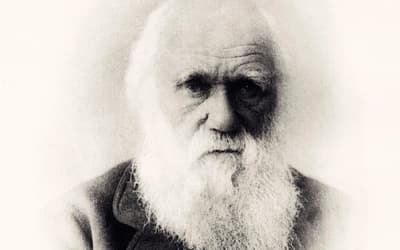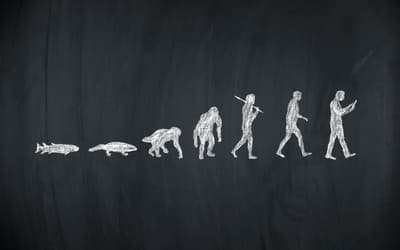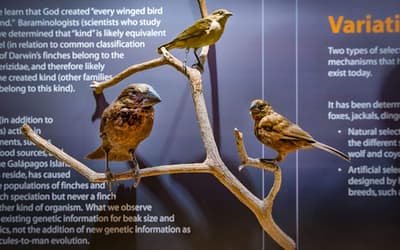The views expressed in this paper are those of the writer(s) and are not necessarily those of the ARJ Editor or Answers in Genesis.
Abstract
This review has two goals, to document from Darwin’s writings that he believed women were inferior to men, and to document that his views greatly influenced modern academia and evolutionists. In reviewing Darwin’s writings, there is no question that Darwin both believed, and taught, that women were intellectually, and in other ways as well, inferior to males. Some claim his ideas, as expressed in the late 1800s, had little effect on how women were viewed in the Western world over the last century and a half.
Conversely, it will be documented that Darwin’s views on women had a significant influence on the negative views of women held by society, especially those of the more educated members, during the last century and, to some extent, even still today. In 2019 British cognitive researcher Professor Gina Rippon observed the widespread idea of female inferiority existing today “goes all the way back to Charles Darwin, who said that women are inferior because they have inferior brains” (Kluger 2019, 68).
Keywords: Charles Darwin, Women Inferiority belief, Natural Selection, Sexual Selection, History of the women’s movement, Sexism, Eliza Burt Gamble, Charlotte Perkins Gilman, the harm caused by Darwin
Darwin’s View of Women
Darwin was very clear about his views of women. He believed women were far less intelligent than men and were inferior in many other ways. Darwin’s book, The Descent of Man, contains an entire section titled “Mental Powers of Men and Women” (Darwin 1871a, vol. 2, 327–329) proclaiming that men attain “a higher eminence, in whatever he takes up, than can women—whether requiring deep thought, reason, or imagination, or merely the use of the senses and hands” (Darwin 1871a, vol. 2, 327). Darwin also stated that “Man is more courageous, pugnacious, and energetic than woman, and has a more inventive genius. His brain is absolutely larger . . .” (Darwin 1871a, vol. 2, 316–317). Evolution, Darwin added, caused man to “ultimately become superior to woman . . . [especially] superior in mental endowment to woman” (Darwin 1871a, vol. 2, 328–329). Consequently, he once opined men not only were “more powerful in body and mind” than women, but even had “gained the power of selection” because, he believed, sexual selection, thus evolution, was in the males’ hands, and females were largely passive in this area (Darwin 1871, 597).
Darwin also believed that “the traditional stereotype of the breadwinning father and the stay-at-home mother [was] really part of our biological makeup” (Saini 2017a, 28). Among the more telling indications of Darwin’s attitude toward women are statements he penned as a young man that listed what he viewed as the advantages of marriage, including children and a constant companion, a friend in old age “who will feel interested in one, object to be beloved and played with—better than a dog anyhow—Home, and someone to take care of house—Charms of music and female chit-chat. These things are good for one’s health” (Barlow 1958, 232–233).
Furthermore, Darwin believed that the “struggle to reproduce was at least as important, if not more important, than the struggle to survive” (Hamlin 2014, 9). Darwin replaced the Genesis Creation account that taught all humans are brothers and sisters, all children of Adam and Eve, by producing “an alternative creation story and a brand new way to understand humans’ place in the universe,” namely we evolved by a process that produced significant differences in both the different races and the two sexes. Darwin concluded that the intellectual superiority of males is proved by the fact that men attain
a higher eminence, in whatever he takes up, than can woman—whether requiring deep thought, reason, or imagination, or merely the use of the senses and hands. . . . We may also infer . . . that if men are capable of a decided pre-eminence over women in many subjects, the average of mental power in man must be above that of women (Darwin 1871, 564).
In Darwin’s words, evolution resulted from the males’ “struggle with other males for the possession of the females” (Darwin 1859, 158). For this reason, men were more sexually aggressive then women. In support of his conclusion, Darwin cited the case of Australian “savage” women, who he claimed were constantly at “war both between members of the same tribe and distant tribes,” resulting in sexual selection do to sexual competition (Darwin 1871, 561). To support his view that “the strongest party always carries off the [female] prize,” Darwin also cited the North American Indian custom that required males to fight male competitors to gain wives (Darwin 1871, 562). The result was that a weaker man seldom could “keep a wife that a stronger man thinks worth his notice” (Darwin 1871, 562).
Darwin’s Views of Women Had a Major Influence on Evolution and Academia
The fact that almost every major defender of women attacked Darwin’s views indicates that they felt that Darwin had a great deal of influence on academia and ideas about the acceptance of evolution in general (Bergman 2014).
A main reason many nineteenth century evolutionary biologists argued for women’s inferiority was because, as stated by Paul Broca (1824–1880), Darwin believed that “unchecked female militancy threatened to produce a perturbance of the” roles of the sexes. Furthermore, female militancy, i.e., the women’s movement, also threatened to “divert the orderly process of evolution” (Fee 1979, 415). The fact is, not only Darwin, but also his disciples, including especially “Prominent scientists [who] have long claimed that male and female brains are fundamentally different, with women less intelligent than men” believed much the same thing (Saini, 2017b). Professor Angela Saini writes, “For centuries, scientists have influenced decision makers on important issues . . . We believe that what science offers us is a story free from prejudice. . . . Yet when it comes to women, so much of this story is wrong” (Saini 2017a, 1) .
Although Charles Darwin was “the most influential evolutionist of the nineteenth (or any) century, did not intentionally upend traditional ideas about gender and sex, . . . that is precisely what his writings helped to do, as many. . . women’s rights activists immediately recognized” (Hamlin 2014, 1). Today, one academic professor concluded that evolutionary psychology was “a scholarly field whose main aim seemed to be to convince non-specialist readers of the scientific validity of the worst gender platitudes of our culture” (Ruti 2015, 2. Emphasis in original). Some examples she gives include “men are hardwired to cheat on their partners; women are the faithful sex.”
According to Hamlin, “Darwin’s work helped to usher in a new, evolutionary cosmology based not on special creation and original sin but on individual fitness, reproductive success, and human-animal kinship” (Hamlin 2014, 4). The key point of Darwin’s theory was that men’s brains and bodies were more evolved because males had to compete for females, and the strongest and smartest were more apt to mate, thus natural selection caused men to become stronger and more intelligent than women (Hamlin 2014, 5).
Men selected women on the basis of physical beauty and sexual attraction, thus she evolved in these traits. Conversely, men did not select women based on her gross muscle strength, nor on her intelligence beyond an average level (Miller 2000, 33–67). Natural selection, on the other hand, would select for men who could take adequate care of their families. As the hunters of food and protectors of the family, males were critical for the family’s survival, which included the wife and children (Hamlin 2014, 6). Thus, Darwin reasoned, evolution would select for men at a much greater level than women, consequently, they evolved to a higher level. Women were protected by the men, were not generally soldiers in armies and, consequently, women remained at a lower level of development (Miller 2000, 215).
An early problem with the belief that males are more intelligent than females is both males and females inherit most of their traits from both their mothers and fathers. Thus, if males were more intelligent than females, this trait would not remain a male trait for very long because their daughters would inherit the father’s intelligence, as would also their sons. Darwin rationalized his problem by reasoning that certain traits are passed on from males only to their male offspring, such as secondary sexual traits including beards, and likewise, he incorrectly believed, intelligence was passed on from males to sons only, not daughters. The evidence for this latter view Darwin never could explain.
Darwin, Women, and Evolution
Because Darwin’s view of women’s inferiority was widely accepted for close to a century and a half, many writers have, inspired by the women’s movement and societal changes in the last 40 years or so, penned scores of books and articles to refute Darwin’s inferior-women belief. The importance of Darwin’s views on women’s inferiority compared to men is central to the women’s movement because of “how women were viewed in one of the most critical moments of modern scientific history, when the foundation of biology were mapped out” based on Darwinism (Saini 2017a, 13).
This fact is illustrated by a December 26, 1881 letter from a Mrs. Caroline Kennard (1827–1907) sent to Darwin inquiring about his views on women (Darwin Correspondence Project; Evans 2017, 225– 226). Kennard was very familiar with the scientific view of women. Her stature in science was such that her scientific achievements allowed her to be listed in the 1885 Scientist’s International Directory as a specialist on the botany of ferns and mosses.
This letter Kennard sent to Darwin was the “only surviving direct challenge Darwin received on his views on women’s intelligence” (Evans 2017, xxxiv). Kennard, a prominent activist for the women’s movement, was then living with her husband in the wealthy suburb of Brookline, Massachusetts, in the outskirts of Boston. Her interest in Darwin was due to claims by those who argued for the inferiority of women based on Darwin’s scientific authority in his Origin of Species and other writings (Saini 2017, 13; Evans 2017, 225).
Kennard is today actually best known primarily for her correspondence with Darwin about his belief that women are biologically inferior to men. Her letter concerned what she termed her surprise that an eminent scientist like Darwin believed women were biologically inferior to men. She assumed his work must have been misinterpreted by those who believed women were inferior. Thus, she wrote to Darwin asking him to clarify his answer and elucidate his conclusions on this matter.
Darwin wrote back to her to assure her that no mistake was made: “Women . . . are inferior intellectually,” he wrote. Since he was writing to a woman, he added his belief that women are superior to men in moral qualities (Evans 2017, 226). Darwin concluded his letter adding, “I have written this letter … only for your private use,” implying it should not be shared with others. According to Saini, the most eminent naturalist in the world, Darwin, produced a letter that “rejected everything the women’s movement was fighting for” (Saini 2017a, 14).
Mrs. Kennard need not have bothered to write to Darwin about his views on this matter. Darwin made it very clear in his Descent of Man and other books that evolution proves women are inferior, and Darwin explained in detail why this was true. Darwin even felt that if evolution were true, the biological inferiority of women must also be true.
Mrs. Kennard wrote a long letter back to Darwin, noting such evidence as that most all educators (she gives the figure of over 83%) are women (Evans 2017, 227). Darwin’s reply, if one was made, was not located by the Darwin Correspondence Project. There is also no evidence of a reply in his massive correspondence in the Cambridge Public Library’s Archives and Special Collections (Saini 2017a, 16).
Darwin believed that thousands of years of evolution had evolved men to attract females in general, a process he called sexual selection. All females had to do was to choose, from the available men, which man she wanted to father her offspring (Miller 2000, 292–340). Thus, men had to compete against other men to win the right to reproduce, as was also true of most mammals.
Darwin drew his theory from the animal kingdom’s focus on reproduction during mating seasons and ignored the element of love, romance, and the need for companionship and mutual attraction common among humans. Darwin provided many examples from the animal world in his published writings, and, since he believed that humans had evolved as did all other mammals, Darwin concluded humans must have evolved with similar sexual drives as animals.
Furthermore, his sexual selection theory taught that men evolved further than women because of the “struggle between the males for possession of the females,” and the better, stronger, and more intelligent man would win, thus be able to reproduce (Hamlin 2014, 8–9). Darwin even tried to explain the origin of maladaptive traits by claiming that they persisted because the opposite sex found them attractive. Why that was so, he never adequately explained (Hamlin 2014, 9). In short, Darwin proposed that, to be attractive as mates, men must be warriors and thinkers, thus evolution “honed them into finer physical specimens with sharper minds. Women are literally less evolved than men” (Saini 2017a, 15. Emphasis in original).
Darwin was not alone as a scientist supporting these patronizing claims. Other examples include Darwin’s own cousin, Francis Galton (Saini 2017a, 17). Nonetheless, Darwin is recognized as a major force propagating the contemporary women-inferiority belief. Darwin’s ideas were far more influential than others who proposed evolution because it was widely believed that “Darwin grounded his theories in rigorous scientific observation and experimentation and they have, by and large, turned out to be accurate” (Hamlin 2014, 7).
Thus, Darwin’s views of women’s inferiority were widely accepted for well over a century and are still accepted by some today. Other evidence that Darwin belied women were not the intellectual equals of men was widely accepted is the fact that numerous books and articles were written in an attempt to refute Darwin’s belief in this area, often by persons who accepted evolution (Saini 2017a, 20).
The Work of Eliza Burt Gamble
One of the most articulate women who openly opposed Darwin was Eliza Burt Gamble (1841–1920), a schoolteacher, school superintendent, and author writing in the nineteenth and early twentieth centuries. She was active in Michigan’s women’s movement, and was the author of three books. As Professor J. David Hoeveler wrote, in “a half century of extraordinary developments for American women, evolution found an important relevance to the subject” and one woman who contributed greatly to that debate was Eliza (Hoeveler 2007, 157). Gamble realized that “scientists had . . . widely accepted Darwin’s thesis but had ignored facts” (Hoeveler 2007, 169) that contradicted his view of women as inferior beings, so she set out to prove that this central plank of Darwinism was wrong.
To achieve this goal, she spent a year at the Library of Congress researching Darwin’s view of sexual inequality which resulted in her seminal book, The Sexes in Science and History: An Inquiry into the Dogma of Woman’s Inferiority to Man (Gamble 1916). Gamble’s book centered around Darwin’s ideas in his 1871 book The Descent of Man on human evolution and sexual selection. Her Dogma book proved very popular, and today, a century after it was published, is in over 3,000 libraries. Her “ideas were praised in reform magazines and her writing style was generally praised, but the scientific and mainstream press balked at her conclusions and at her pretensions to write about ‘science’” because she was not a scientist (Saini 2017a, 21).
As a whole, science and particularly evolutionists, rejected it as not being scientific, thus not worth considering. As Saini shows, the many books and articles written by Gamble refuting Darwin’s view of women didn’t “win biologists around to her point of view. Her arguments were doomed to never enter the scientific mainstream” (Saini 2017a, 21). The “path paved by Eliza Burt Gamble, the pioneering suffragist who had dared to challenge Charles Darwin . . . was being trodden again by a new generation of scientists” (Saini 2017a, 27).
After Gamble’s other books were published challenging Darwin’s view of women, the evolutionists dug their heels in and, in the century after Gamble’s death, evolutionists “became only more obsessed by … enforcing the dogma that men are somehow better than women” (Saini 2017a, 22).
Charlotte Perkins Gilman
Another woman who effectively challenged Darwin’s view of women was Charlotte Perkins Gilman (1860–1935) who wrote the best-selling book entitled, Women and Economics: A Study of the Economic Relation Between Men and Women as a Factor in Social Evolution (Gilman 1898). The book was an overnight success and was soon translated into seven different languages. This leading American author and social reformer observed that Darwin taught “half of the human race [females] had been kept down at a lower stage of evolution by the other half [males]” (Saini 2017a, 18). Social Darwinism permeates much of her book, which is still in print today (Saini 2017a,18).
Her interest in evolution was developed by her father, Frederick Gilman, who had a critical influence on his daughter’s work. Frederick’s
interest in Darwinism, especially as it was influencing scholarship in anthropology. He also included . . . Popular Science [magazine] which was [then] playing a key role in informing American readers of new directions in evolutionary thinking. Collectively, Charlotte’s new reading immersed her in ideas about race. (Hoeveler 2007, 158) His conclusion from this reading was that the ‘white man’ was on the “cutting edge of civilization’s advancement and [the result was the] ‘primitive’ races [Blacks, would be judged] as evolutionary losers” (Hoeveler 2007, 158).
His daughter, Charlotte, had the same concerns, only about women as being inferior to men, a topic she wrote in detail to deal with some of the same arguments Darwin advocated. Many other women followed the two women noted above, but both Eliza Gamble and Charlotte Gilman were leaders in debunking Darwin’s views on women. Many modern academics have reiterated after them, largely just repeating and updating these arguments against Darwin’s view of women (Ruti 2015, 12).
Professor Ruti, in a review of evolutionary psychology research, observed “what struck me most forcefully was the field’s stubborn loyalty to Darwin’s pronouncements about gender differences” (Ruti 2015, 3). One result of Darwin’s influence was widespread discrimination against women in science until fairly recently (Schiebinger 1889). The primary founder of the modern women’s movement, Gloria Steinem, concluded that Darwin’s influence in the latter part of the twentieth century was strong enough that she covered Darwin’s contribution to the problem of discrimination in several of her written works (Steinem 2012, 139, 150, 299).
Conclusion
A small sample of the enormous literature produced by the women’s movement, and both women and men scholars from the middle 1800 to 2017, documents that much concern was expressed about the major negative impact Darwin had on society that was detrimental to women. The documentation of the major accounts of discrimination against women clearly supports the conclusion that Darwin’s view of women’s inferiority had a major adverse effect on women’s opportunities and how they were perceived by society at large.
Ironically, many writers referenced in this review accepted evolution and attempted to harmonize their view of male-female inequality with the evolutionary forces that created humans (Saini 2017a, 94). In contrast, the Scriptures and Christianity have painted a lofty vision of women’s importance in the family, the workforce, and society as a whole.
References
Barlow, Nora. ed. 1958. The Autobiography of Charles Darwin 1809–1882. New York, New York: W. W. Norton & Company.
Bergman, Jerry. 2014. The Darwin Effect: Its Influence on Nazism, Eugenics, Racism, Communism, Capitalism and Sexism. Green Forest, Arkansas: Master Books.
Darwin, Charles. 1859. On the Origin of Species by Means of Natural Selection, or the Preservation of Favoured Races in the Struggle for Life. London, United Kingdom: John Murray.
Darwin, Charles. 1871a. The Descent of Man, and Selection in Relation to Sex. Vols. 1 and 2. London, United Kingdom: John Murray.
Darwin, Charles. 1871b. The Descent of Man, and Selection in Relation to Sex. London, United Kingdom: John Murray.
Darwin Correspondence Project, “Letter no. 13579,” accessed on 30 November 2019. https://www.darwinproject.ac.uk/ letter/DCP-LETT-13579.xml. The letter is not online yet. It was reprinted in Evans, 2017, 225–226.
Evans, Samantha. ed. 2017. Darwin and Women: A Selection of Letters. New York, New York: Cambridge University Press.
Fee, Elizabeth. 1979. “Nineteenth-Century Craniology: The Study of the Female Skull.” Bulletin of the History of Medicine 53, no. 3 (Fall): 415–433.
Gamble, Eliza Burt. 1894. The Evolution of Woman: An Inquiry Into the Dogma of Her Inferiority to Man. New York, New York: G. P. Putnam’s Sons.
Gamble, Eliza Burt. 1916. The Sexes in Science and History: An Inquiry Into the Dogma of Woman’s Inferiority to Man. Westport, Connecticut: Hyperion Press.
Gilman, Charlotte Perkins. 1898. Women and Economics—A Study of the Economic Relation Between Men and Women as a Factor in Social Evolution. Boston, Massachusetts: Small, Maynard & Co.
Hamlin, Kimberly A. 2014. From Eve to Evolution: Darwin, Science, and Women’s Rights in Gilded Age America. Chicago, Illinois: The University of Chicago Press.
Hoeveler, J. David. 2007. The Evolutionists: American Thinkers Confront Charles Darwin, 1860–1920. (Critical Issues in American History). Boulder, Colorado: Rowman & Littlefield Publishers.
Kluger, Jeffrey. 2019. “6 Questions.” Time 194, no. 10 (September): 68.
Miller, Geoffrey. 2000. The Mating Mind: How Sexual Choice Shaped the Evolution of Human Nature. New York, New York: Anchor Books.
Ruti, Mari. 2015. The Age of Scientific Sexism: How Evolutionary Psychology Promotes Gender Profiling and Fans the Battle of the Sexes. New York, New York: Bloomsbury Academic.
Saini, Angela. 2017a. Inferior: How Science Got Women Wrong—and the New Research That’s Rewriting the Story. Boston, Massachusetts: Beacon Press.
Saini, Angela. 2017b. “From Darwin to Damore, How Modern Science Failed Women.” NBC News Now, October 17. https://www.nbcnews.com/think/opinion/darwin-damore-how-modern-science-failed-women-ncna801586.
Schiebinger, Londa. 1989. The Mind Has No Sex?: Women in the Origins of Modern Science. Cambridge, Massachusetts: Harvard University Press.
Steinem, Gloria. 2012. Revolution from Within: A Book of Self-Esteem. Boston, Massachusetts: Little, Brown and Company.










